Gibbs Reflective Cycle - Paramedic: Bariatric Patient Admission
VerifiedAdded on 2019/12/28
|15
|4712
|192
Report
AI Summary
This report presents a Gibbs reflective cycle analysis of a paramedic's experience during the planned admission of a bariatric patient. The essay begins with an introduction to reflective writing and its importance in paramedic practice, referencing the Gibbs model. The author describes a specific event: a late-night call for a bariatric patient admission to the hospital. The narrative details the challenges faced, including difficulties with the patient's transport due to the patient's size and the layout of the house. The paramedic reflects on their initial assumptions, the emotional impact of the situation, and the ethical considerations involved. The essay includes a description of the event, the paramedic's feelings and thoughts, an analysis of the event's positives and negatives, and a discussion of how they would approach a similar situation in the future. The report emphasizes the importance of confidentiality, using pseudonyms throughout the analysis. The paramedic's reflections highlight the importance of empathy and the need for specialized equipment and training when dealing with bariatric patients. The essay serves as a tool for personal and professional development, emphasizing the value of reflective practice in healthcare.
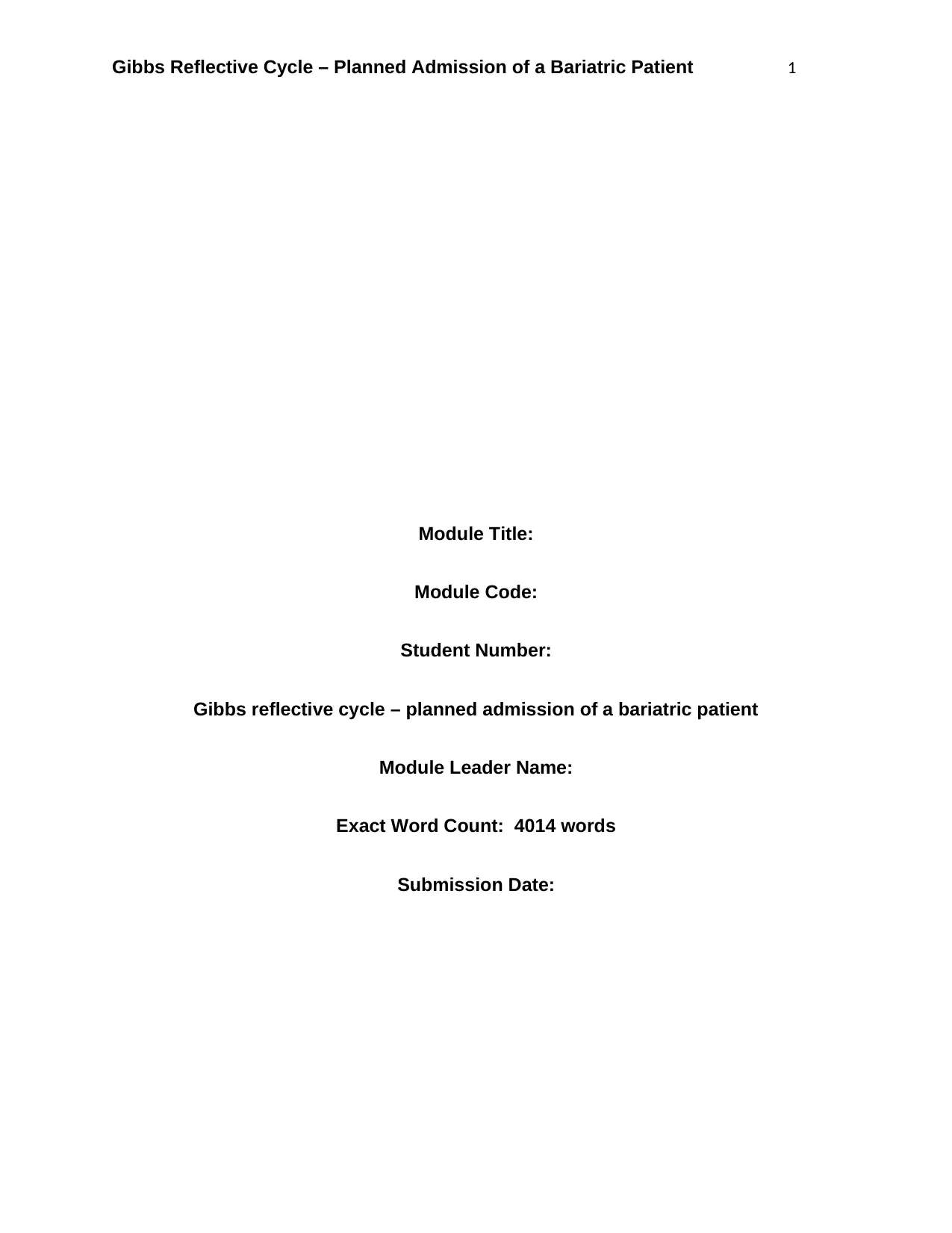
Gibbs Reflective Cycle – Planned Admission of a Bariatric Patient 1
Module Title:
Module Code:
Student Number:
Gibbs reflective cycle – planned admission of a bariatric patient
Module Leader Name:
Exact Word Count: 4014 words
Submission Date:
Module Title:
Module Code:
Student Number:
Gibbs reflective cycle – planned admission of a bariatric patient
Module Leader Name:
Exact Word Count: 4014 words
Submission Date:
Paraphrase This Document
Need a fresh take? Get an instant paraphrase of this document with our AI Paraphraser
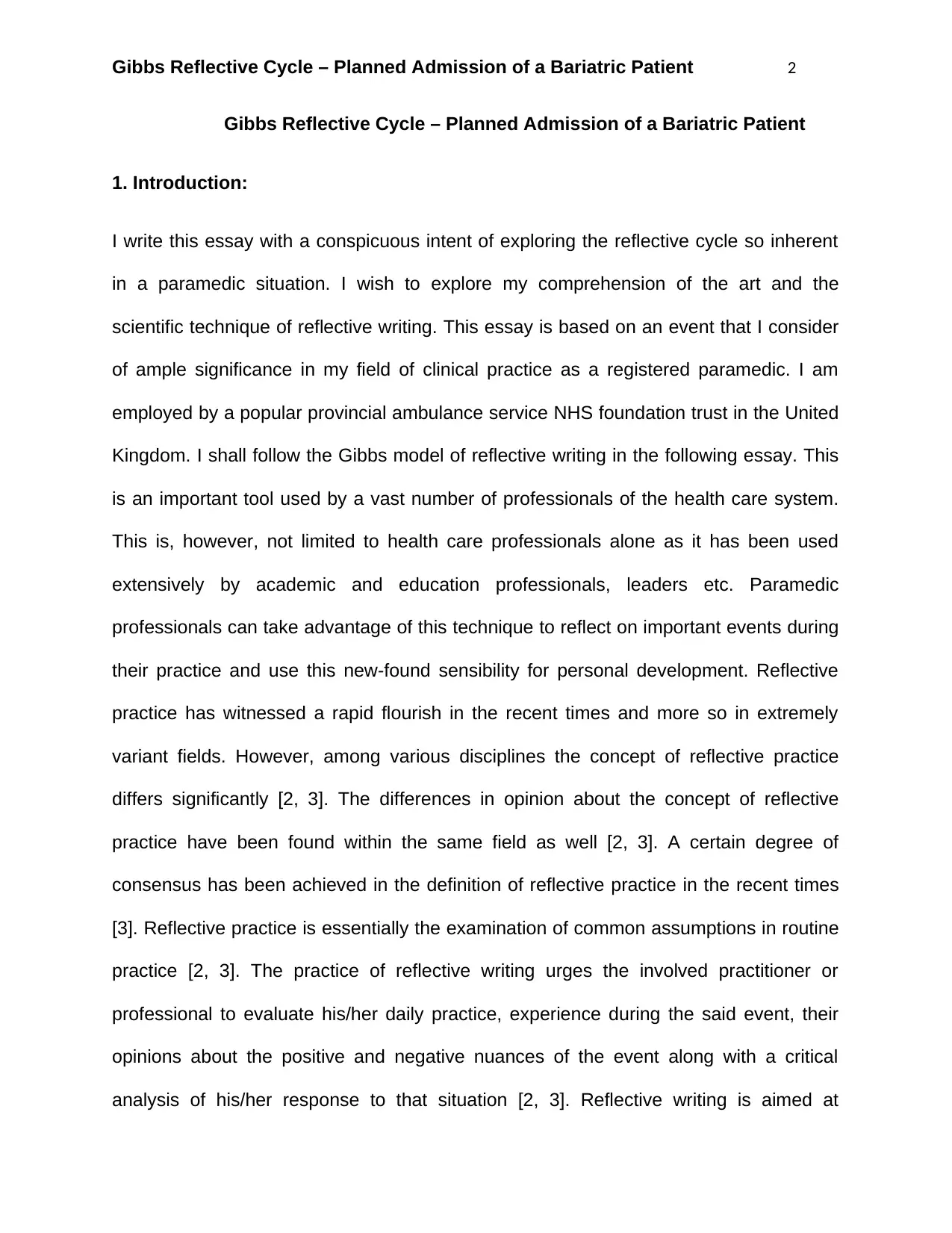
Gibbs Reflective Cycle – Planned Admission of a Bariatric Patient 2
Gibbs Reflective Cycle – Planned Admission of a Bariatric Patient
1. Introduction:
I write this essay with a conspicuous intent of exploring the reflective cycle so inherent
in a paramedic situation. I wish to explore my comprehension of the art and the
scientific technique of reflective writing. This essay is based on an event that I consider
of ample significance in my field of clinical practice as a registered paramedic. I am
employed by a popular provincial ambulance service NHS foundation trust in the United
Kingdom. I shall follow the Gibbs model of reflective writing in the following essay. This
is an important tool used by a vast number of professionals of the health care system.
This is, however, not limited to health care professionals alone as it has been used
extensively by academic and education professionals, leaders etc. Paramedic
professionals can take advantage of this technique to reflect on important events during
their practice and use this new-found sensibility for personal development. Reflective
practice has witnessed a rapid flourish in the recent times and more so in extremely
variant fields. However, among various disciplines the concept of reflective practice
differs significantly [2, 3]. The differences in opinion about the concept of reflective
practice have been found within the same field as well [2, 3]. A certain degree of
consensus has been achieved in the definition of reflective practice in the recent times
[3]. Reflective practice is essentially the examination of common assumptions in routine
practice [2, 3]. The practice of reflective writing urges the involved practitioner or
professional to evaluate his/her daily practice, experience during the said event, their
opinions about the positive and negative nuances of the event along with a critical
analysis of his/her response to that situation [2, 3]. Reflective writing is aimed at
Gibbs Reflective Cycle – Planned Admission of a Bariatric Patient
1. Introduction:
I write this essay with a conspicuous intent of exploring the reflective cycle so inherent
in a paramedic situation. I wish to explore my comprehension of the art and the
scientific technique of reflective writing. This essay is based on an event that I consider
of ample significance in my field of clinical practice as a registered paramedic. I am
employed by a popular provincial ambulance service NHS foundation trust in the United
Kingdom. I shall follow the Gibbs model of reflective writing in the following essay. This
is an important tool used by a vast number of professionals of the health care system.
This is, however, not limited to health care professionals alone as it has been used
extensively by academic and education professionals, leaders etc. Paramedic
professionals can take advantage of this technique to reflect on important events during
their practice and use this new-found sensibility for personal development. Reflective
practice has witnessed a rapid flourish in the recent times and more so in extremely
variant fields. However, among various disciplines the concept of reflective practice
differs significantly [2, 3]. The differences in opinion about the concept of reflective
practice have been found within the same field as well [2, 3]. A certain degree of
consensus has been achieved in the definition of reflective practice in the recent times
[3]. Reflective practice is essentially the examination of common assumptions in routine
practice [2, 3]. The practice of reflective writing urges the involved practitioner or
professional to evaluate his/her daily practice, experience during the said event, their
opinions about the positive and negative nuances of the event along with a critical
analysis of his/her response to that situation [2, 3]. Reflective writing is aimed at
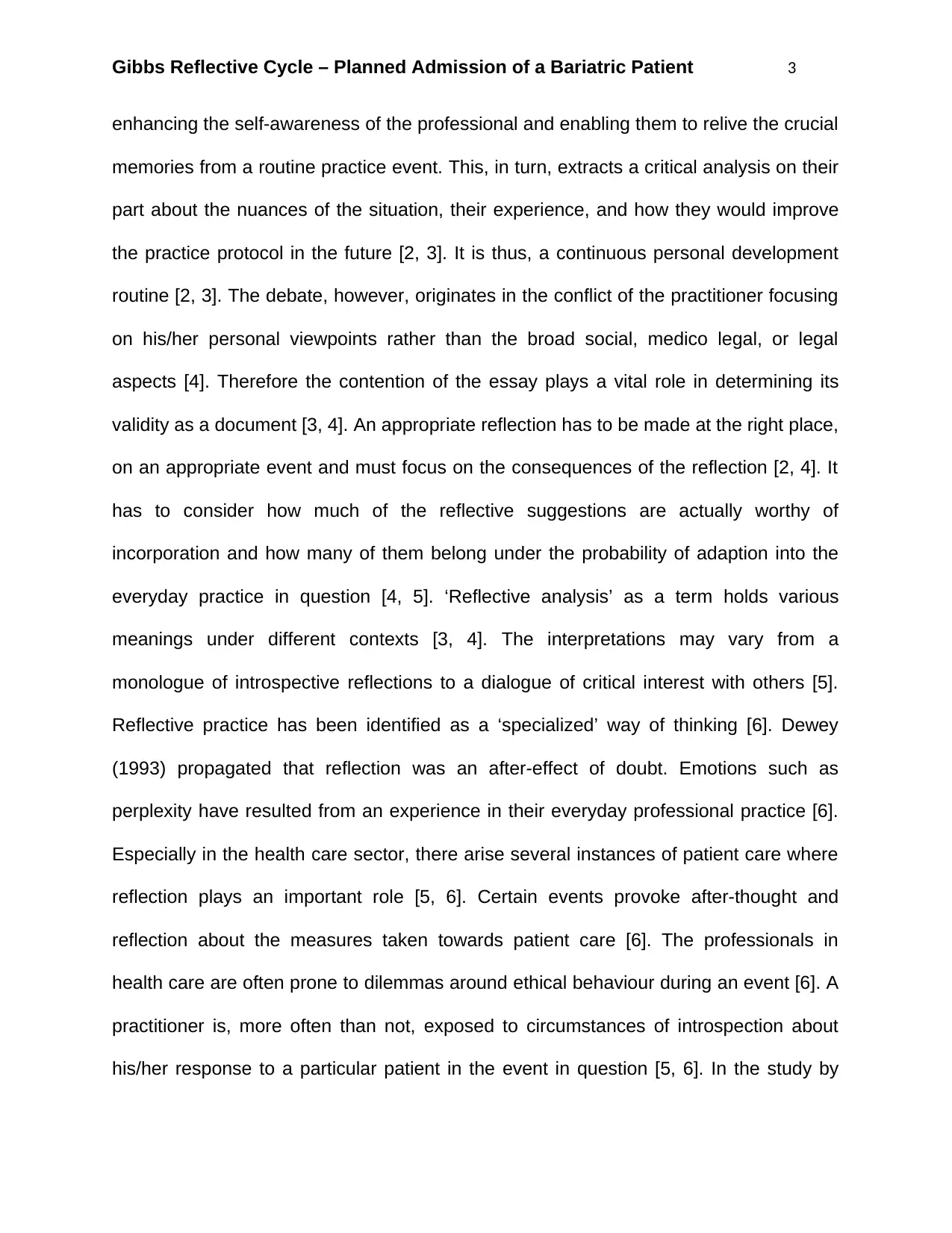
Gibbs Reflective Cycle – Planned Admission of a Bariatric Patient 3
enhancing the self-awareness of the professional and enabling them to relive the crucial
memories from a routine practice event. This, in turn, extracts a critical analysis on their
part about the nuances of the situation, their experience, and how they would improve
the practice protocol in the future [2, 3]. It is thus, a continuous personal development
routine [2, 3]. The debate, however, originates in the conflict of the practitioner focusing
on his/her personal viewpoints rather than the broad social, medico legal, or legal
aspects [4]. Therefore the contention of the essay plays a vital role in determining its
validity as a document [3, 4]. An appropriate reflection has to be made at the right place,
on an appropriate event and must focus on the consequences of the reflection [2, 4]. It
has to consider how much of the reflective suggestions are actually worthy of
incorporation and how many of them belong under the probability of adaption into the
everyday practice in question [4, 5]. ‘Reflective analysis’ as a term holds various
meanings under different contexts [3, 4]. The interpretations may vary from a
monologue of introspective reflections to a dialogue of critical interest with others [5].
Reflective practice has been identified as a ‘specialized’ way of thinking [6]. Dewey
(1993) propagated that reflection was an after-effect of doubt. Emotions such as
perplexity have resulted from an experience in their everyday professional practice [6].
Especially in the health care sector, there arise several instances of patient care where
reflection plays an important role [5, 6]. Certain events provoke after-thought and
reflection about the measures taken towards patient care [6]. The professionals in
health care are often prone to dilemmas around ethical behaviour during an event [6]. A
practitioner is, more often than not, exposed to circumstances of introspection about
his/her response to a particular patient in the event in question [5, 6]. In the study by
enhancing the self-awareness of the professional and enabling them to relive the crucial
memories from a routine practice event. This, in turn, extracts a critical analysis on their
part about the nuances of the situation, their experience, and how they would improve
the practice protocol in the future [2, 3]. It is thus, a continuous personal development
routine [2, 3]. The debate, however, originates in the conflict of the practitioner focusing
on his/her personal viewpoints rather than the broad social, medico legal, or legal
aspects [4]. Therefore the contention of the essay plays a vital role in determining its
validity as a document [3, 4]. An appropriate reflection has to be made at the right place,
on an appropriate event and must focus on the consequences of the reflection [2, 4]. It
has to consider how much of the reflective suggestions are actually worthy of
incorporation and how many of them belong under the probability of adaption into the
everyday practice in question [4, 5]. ‘Reflective analysis’ as a term holds various
meanings under different contexts [3, 4]. The interpretations may vary from a
monologue of introspective reflections to a dialogue of critical interest with others [5].
Reflective practice has been identified as a ‘specialized’ way of thinking [6]. Dewey
(1993) propagated that reflection was an after-effect of doubt. Emotions such as
perplexity have resulted from an experience in their everyday professional practice [6].
Especially in the health care sector, there arise several instances of patient care where
reflection plays an important role [5, 6]. Certain events provoke after-thought and
reflection about the measures taken towards patient care [6]. The professionals in
health care are often prone to dilemmas around ethical behaviour during an event [6]. A
practitioner is, more often than not, exposed to circumstances of introspection about
his/her response to a particular patient in the event in question [5, 6]. In the study by
⊘ This is a preview!⊘
Do you want full access?
Subscribe today to unlock all pages.

Trusted by 1+ million students worldwide
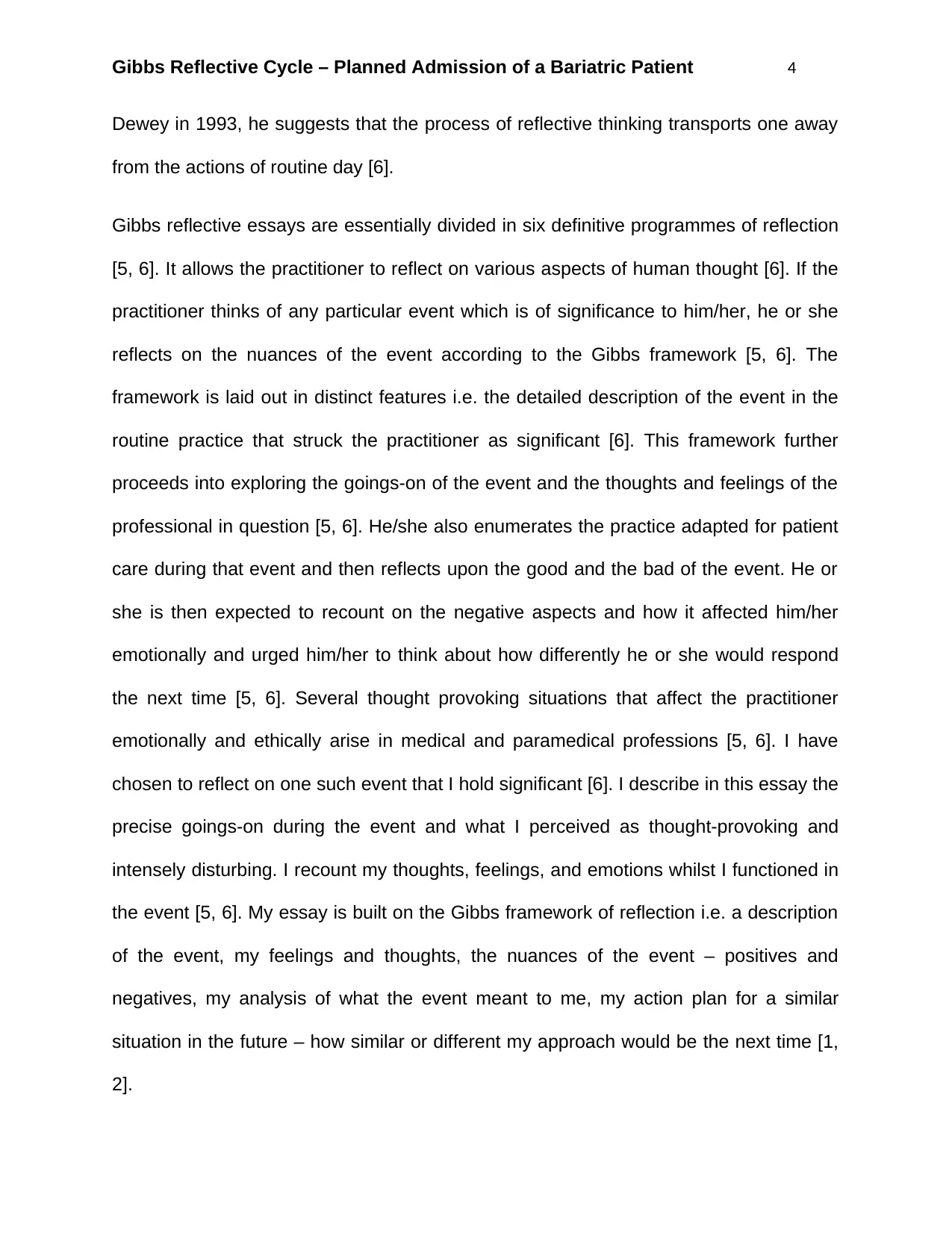
Gibbs Reflective Cycle – Planned Admission of a Bariatric Patient 4
Dewey in 1993, he suggests that the process of reflective thinking transports one away
from the actions of routine day [6].
Gibbs reflective essays are essentially divided in six definitive programmes of reflection
[5, 6]. It allows the practitioner to reflect on various aspects of human thought [6]. If the
practitioner thinks of any particular event which is of significance to him/her, he or she
reflects on the nuances of the event according to the Gibbs framework [5, 6]. The
framework is laid out in distinct features i.e. the detailed description of the event in the
routine practice that struck the practitioner as significant [6]. This framework further
proceeds into exploring the goings-on of the event and the thoughts and feelings of the
professional in question [5, 6]. He/she also enumerates the practice adapted for patient
care during that event and then reflects upon the good and the bad of the event. He or
she is then expected to recount on the negative aspects and how it affected him/her
emotionally and urged him/her to think about how differently he or she would respond
the next time [5, 6]. Several thought provoking situations that affect the practitioner
emotionally and ethically arise in medical and paramedical professions [5, 6]. I have
chosen to reflect on one such event that I hold significant [6]. I describe in this essay the
precise goings-on during the event and what I perceived as thought-provoking and
intensely disturbing. I recount my thoughts, feelings, and emotions whilst I functioned in
the event [5, 6]. My essay is built on the Gibbs framework of reflection i.e. a description
of the event, my feelings and thoughts, the nuances of the event – positives and
negatives, my analysis of what the event meant to me, my action plan for a similar
situation in the future – how similar or different my approach would be the next time [1,
2].
Dewey in 1993, he suggests that the process of reflective thinking transports one away
from the actions of routine day [6].
Gibbs reflective essays are essentially divided in six definitive programmes of reflection
[5, 6]. It allows the practitioner to reflect on various aspects of human thought [6]. If the
practitioner thinks of any particular event which is of significance to him/her, he or she
reflects on the nuances of the event according to the Gibbs framework [5, 6]. The
framework is laid out in distinct features i.e. the detailed description of the event in the
routine practice that struck the practitioner as significant [6]. This framework further
proceeds into exploring the goings-on of the event and the thoughts and feelings of the
professional in question [5, 6]. He/she also enumerates the practice adapted for patient
care during that event and then reflects upon the good and the bad of the event. He or
she is then expected to recount on the negative aspects and how it affected him/her
emotionally and urged him/her to think about how differently he or she would respond
the next time [5, 6]. Several thought provoking situations that affect the practitioner
emotionally and ethically arise in medical and paramedical professions [5, 6]. I have
chosen to reflect on one such event that I hold significant [6]. I describe in this essay the
precise goings-on during the event and what I perceived as thought-provoking and
intensely disturbing. I recount my thoughts, feelings, and emotions whilst I functioned in
the event [5, 6]. My essay is built on the Gibbs framework of reflection i.e. a description
of the event, my feelings and thoughts, the nuances of the event – positives and
negatives, my analysis of what the event meant to me, my action plan for a similar
situation in the future – how similar or different my approach would be the next time [1,
2].
Paraphrase This Document
Need a fresh take? Get an instant paraphrase of this document with our AI Paraphraser
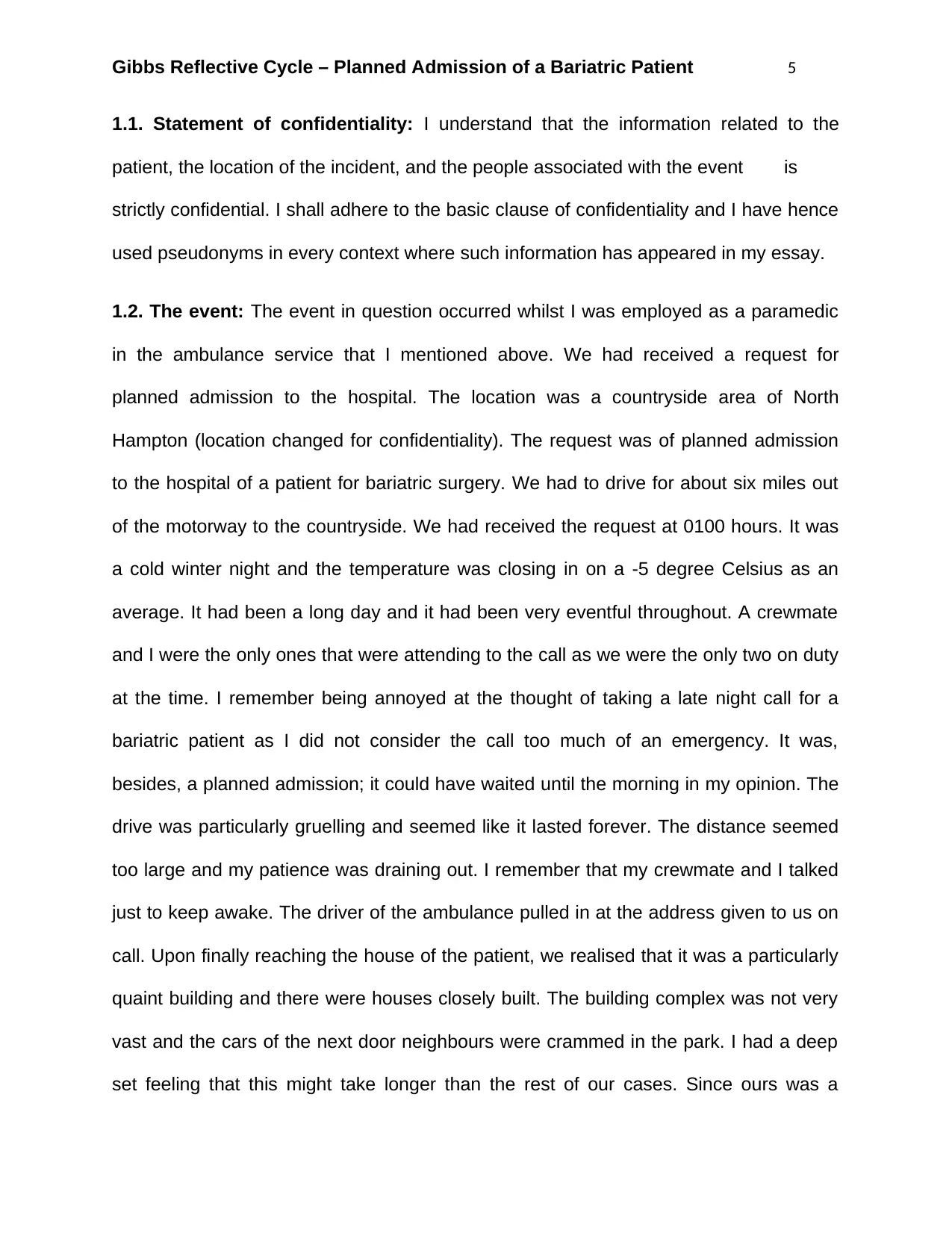
Gibbs Reflective Cycle – Planned Admission of a Bariatric Patient 5
1.1. Statement of confidentiality: I understand that the information related to the
patient, the location of the incident, and the people associated with the event is
strictly confidential. I shall adhere to the basic clause of confidentiality and I have hence
used pseudonyms in every context where such information has appeared in my essay.
1.2. The event: The event in question occurred whilst I was employed as a paramedic
in the ambulance service that I mentioned above. We had received a request for
planned admission to the hospital. The location was a countryside area of North
Hampton (location changed for confidentiality). The request was of planned admission
to the hospital of a patient for bariatric surgery. We had to drive for about six miles out
of the motorway to the countryside. We had received the request at 0100 hours. It was
a cold winter night and the temperature was closing in on a -5 degree Celsius as an
average. It had been a long day and it had been very eventful throughout. A crewmate
and I were the only ones that were attending to the call as we were the only two on duty
at the time. I remember being annoyed at the thought of taking a late night call for a
bariatric patient as I did not consider the call too much of an emergency. It was,
besides, a planned admission; it could have waited until the morning in my opinion. The
drive was particularly gruelling and seemed like it lasted forever. The distance seemed
too large and my patience was draining out. I remember that my crewmate and I talked
just to keep awake. The driver of the ambulance pulled in at the address given to us on
call. Upon finally reaching the house of the patient, we realised that it was a particularly
quaint building and there were houses closely built. The building complex was not very
vast and the cars of the next door neighbours were crammed in the park. I had a deep
set feeling that this might take longer than the rest of our cases. Since ours was a
1.1. Statement of confidentiality: I understand that the information related to the
patient, the location of the incident, and the people associated with the event is
strictly confidential. I shall adhere to the basic clause of confidentiality and I have hence
used pseudonyms in every context where such information has appeared in my essay.
1.2. The event: The event in question occurred whilst I was employed as a paramedic
in the ambulance service that I mentioned above. We had received a request for
planned admission to the hospital. The location was a countryside area of North
Hampton (location changed for confidentiality). The request was of planned admission
to the hospital of a patient for bariatric surgery. We had to drive for about six miles out
of the motorway to the countryside. We had received the request at 0100 hours. It was
a cold winter night and the temperature was closing in on a -5 degree Celsius as an
average. It had been a long day and it had been very eventful throughout. A crewmate
and I were the only ones that were attending to the call as we were the only two on duty
at the time. I remember being annoyed at the thought of taking a late night call for a
bariatric patient as I did not consider the call too much of an emergency. It was,
besides, a planned admission; it could have waited until the morning in my opinion. The
drive was particularly gruelling and seemed like it lasted forever. The distance seemed
too large and my patience was draining out. I remember that my crewmate and I talked
just to keep awake. The driver of the ambulance pulled in at the address given to us on
call. Upon finally reaching the house of the patient, we realised that it was a particularly
quaint building and there were houses closely built. The building complex was not very
vast and the cars of the next door neighbours were crammed in the park. I had a deep
set feeling that this might take longer than the rest of our cases. Since ours was a
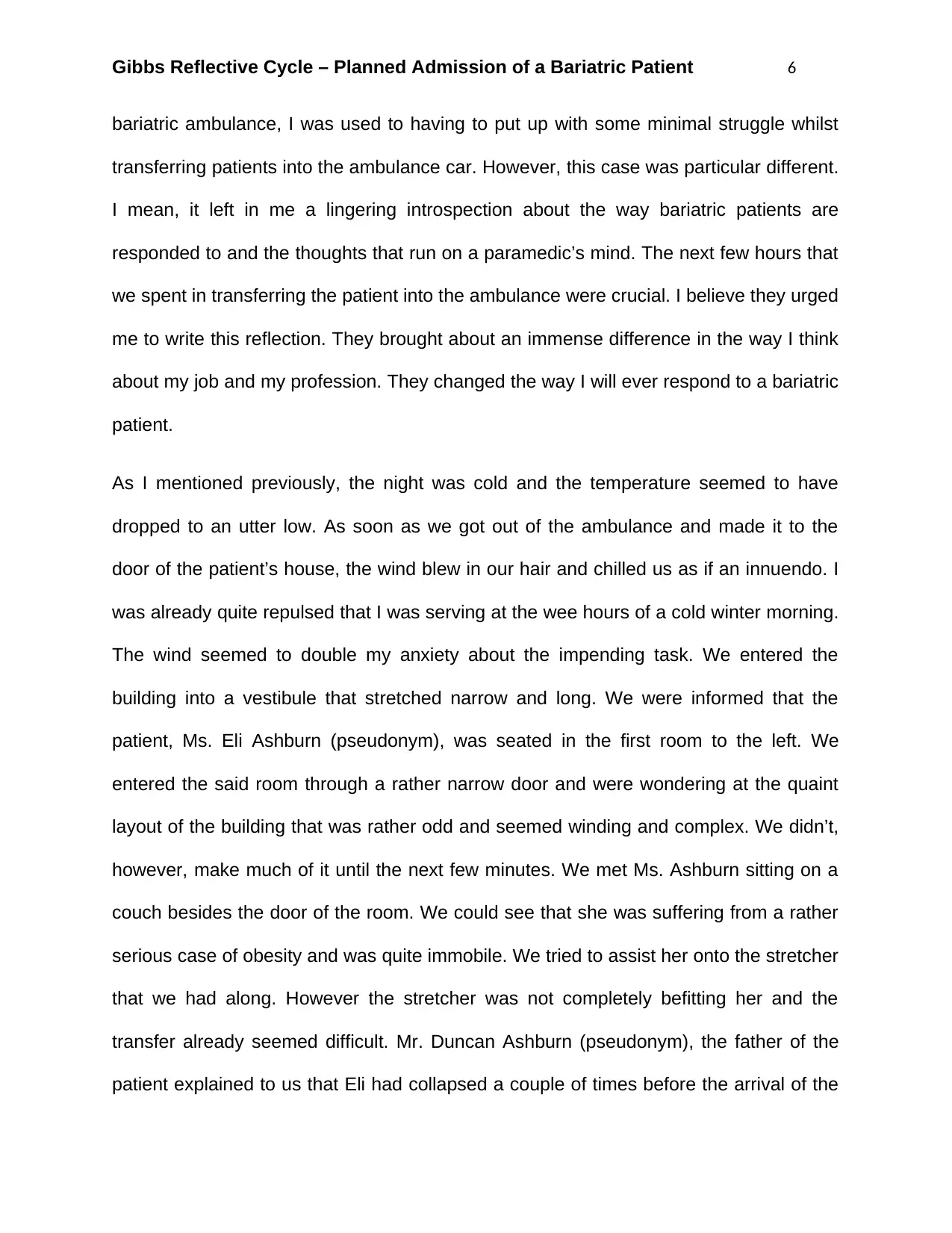
Gibbs Reflective Cycle – Planned Admission of a Bariatric Patient 6
bariatric ambulance, I was used to having to put up with some minimal struggle whilst
transferring patients into the ambulance car. However, this case was particular different.
I mean, it left in me a lingering introspection about the way bariatric patients are
responded to and the thoughts that run on a paramedic’s mind. The next few hours that
we spent in transferring the patient into the ambulance were crucial. I believe they urged
me to write this reflection. They brought about an immense difference in the way I think
about my job and my profession. They changed the way I will ever respond to a bariatric
patient.
As I mentioned previously, the night was cold and the temperature seemed to have
dropped to an utter low. As soon as we got out of the ambulance and made it to the
door of the patient’s house, the wind blew in our hair and chilled us as if an innuendo. I
was already quite repulsed that I was serving at the wee hours of a cold winter morning.
The wind seemed to double my anxiety about the impending task. We entered the
building into a vestibule that stretched narrow and long. We were informed that the
patient, Ms. Eli Ashburn (pseudonym), was seated in the first room to the left. We
entered the said room through a rather narrow door and were wondering at the quaint
layout of the building that was rather odd and seemed winding and complex. We didn’t,
however, make much of it until the next few minutes. We met Ms. Ashburn sitting on a
couch besides the door of the room. We could see that she was suffering from a rather
serious case of obesity and was quite immobile. We tried to assist her onto the stretcher
that we had along. However the stretcher was not completely befitting her and the
transfer already seemed difficult. Mr. Duncan Ashburn (pseudonym), the father of the
patient explained to us that Eli had collapsed a couple of times before the arrival of the
bariatric ambulance, I was used to having to put up with some minimal struggle whilst
transferring patients into the ambulance car. However, this case was particular different.
I mean, it left in me a lingering introspection about the way bariatric patients are
responded to and the thoughts that run on a paramedic’s mind. The next few hours that
we spent in transferring the patient into the ambulance were crucial. I believe they urged
me to write this reflection. They brought about an immense difference in the way I think
about my job and my profession. They changed the way I will ever respond to a bariatric
patient.
As I mentioned previously, the night was cold and the temperature seemed to have
dropped to an utter low. As soon as we got out of the ambulance and made it to the
door of the patient’s house, the wind blew in our hair and chilled us as if an innuendo. I
was already quite repulsed that I was serving at the wee hours of a cold winter morning.
The wind seemed to double my anxiety about the impending task. We entered the
building into a vestibule that stretched narrow and long. We were informed that the
patient, Ms. Eli Ashburn (pseudonym), was seated in the first room to the left. We
entered the said room through a rather narrow door and were wondering at the quaint
layout of the building that was rather odd and seemed winding and complex. We didn’t,
however, make much of it until the next few minutes. We met Ms. Ashburn sitting on a
couch besides the door of the room. We could see that she was suffering from a rather
serious case of obesity and was quite immobile. We tried to assist her onto the stretcher
that we had along. However the stretcher was not completely befitting her and the
transfer already seemed difficult. Mr. Duncan Ashburn (pseudonym), the father of the
patient explained to us that Eli had collapsed a couple of times before the arrival of the
⊘ This is a preview!⊘
Do you want full access?
Subscribe today to unlock all pages.

Trusted by 1+ million students worldwide
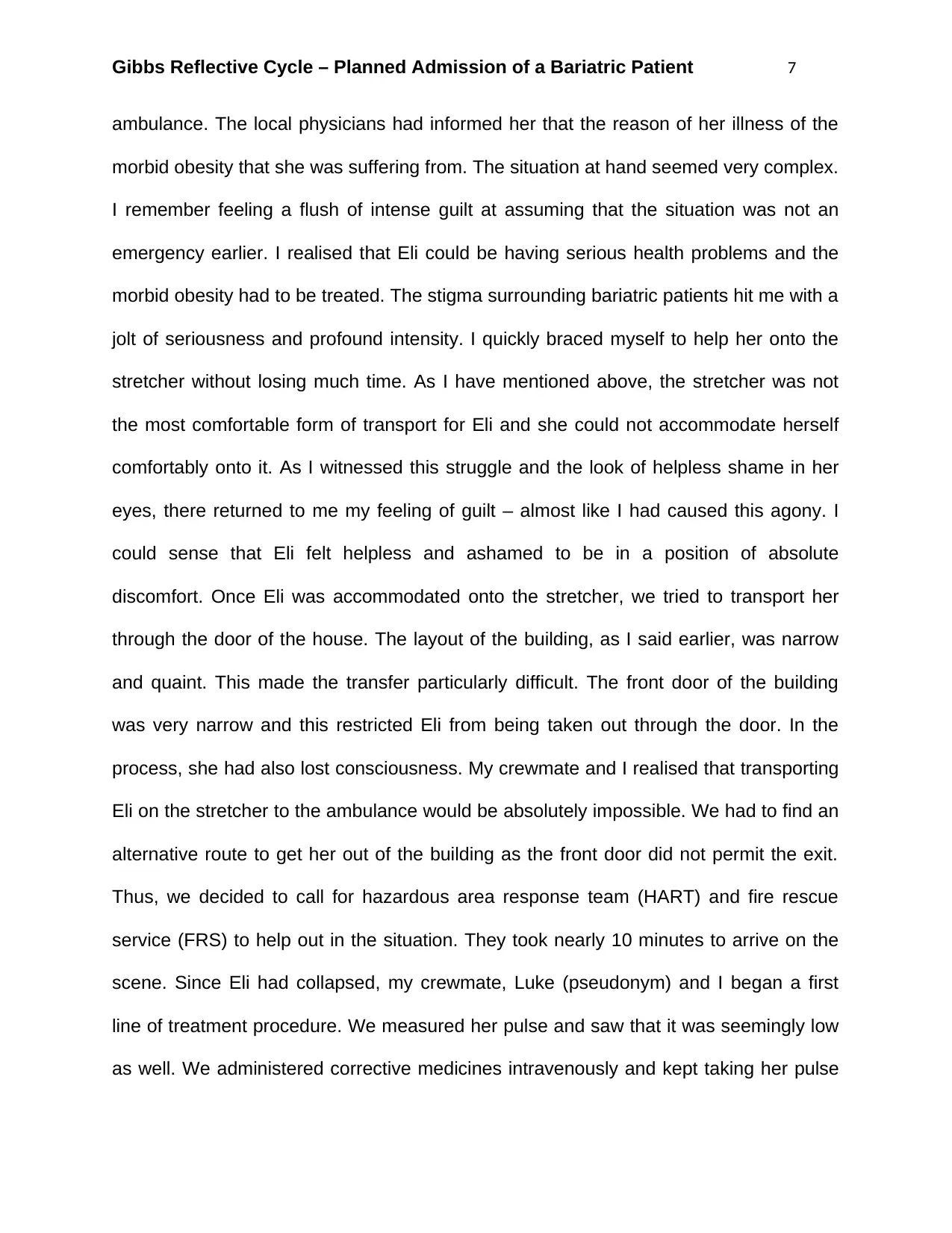
Gibbs Reflective Cycle – Planned Admission of a Bariatric Patient 7
ambulance. The local physicians had informed her that the reason of her illness of the
morbid obesity that she was suffering from. The situation at hand seemed very complex.
I remember feeling a flush of intense guilt at assuming that the situation was not an
emergency earlier. I realised that Eli could be having serious health problems and the
morbid obesity had to be treated. The stigma surrounding bariatric patients hit me with a
jolt of seriousness and profound intensity. I quickly braced myself to help her onto the
stretcher without losing much time. As I have mentioned above, the stretcher was not
the most comfortable form of transport for Eli and she could not accommodate herself
comfortably onto it. As I witnessed this struggle and the look of helpless shame in her
eyes, there returned to me my feeling of guilt – almost like I had caused this agony. I
could sense that Eli felt helpless and ashamed to be in a position of absolute
discomfort. Once Eli was accommodated onto the stretcher, we tried to transport her
through the door of the house. The layout of the building, as I said earlier, was narrow
and quaint. This made the transfer particularly difficult. The front door of the building
was very narrow and this restricted Eli from being taken out through the door. In the
process, she had also lost consciousness. My crewmate and I realised that transporting
Eli on the stretcher to the ambulance would be absolutely impossible. We had to find an
alternative route to get her out of the building as the front door did not permit the exit.
Thus, we decided to call for hazardous area response team (HART) and fire rescue
service (FRS) to help out in the situation. They took nearly 10 minutes to arrive on the
scene. Since Eli had collapsed, my crewmate, Luke (pseudonym) and I began a first
line of treatment procedure. We measured her pulse and saw that it was seemingly low
as well. We administered corrective medicines intravenously and kept taking her pulse
ambulance. The local physicians had informed her that the reason of her illness of the
morbid obesity that she was suffering from. The situation at hand seemed very complex.
I remember feeling a flush of intense guilt at assuming that the situation was not an
emergency earlier. I realised that Eli could be having serious health problems and the
morbid obesity had to be treated. The stigma surrounding bariatric patients hit me with a
jolt of seriousness and profound intensity. I quickly braced myself to help her onto the
stretcher without losing much time. As I have mentioned above, the stretcher was not
the most comfortable form of transport for Eli and she could not accommodate herself
comfortably onto it. As I witnessed this struggle and the look of helpless shame in her
eyes, there returned to me my feeling of guilt – almost like I had caused this agony. I
could sense that Eli felt helpless and ashamed to be in a position of absolute
discomfort. Once Eli was accommodated onto the stretcher, we tried to transport her
through the door of the house. The layout of the building, as I said earlier, was narrow
and quaint. This made the transfer particularly difficult. The front door of the building
was very narrow and this restricted Eli from being taken out through the door. In the
process, she had also lost consciousness. My crewmate and I realised that transporting
Eli on the stretcher to the ambulance would be absolutely impossible. We had to find an
alternative route to get her out of the building as the front door did not permit the exit.
Thus, we decided to call for hazardous area response team (HART) and fire rescue
service (FRS) to help out in the situation. They took nearly 10 minutes to arrive on the
scene. Since Eli had collapsed, my crewmate, Luke (pseudonym) and I began a first
line of treatment procedure. We measured her pulse and saw that it was seemingly low
as well. We administered corrective medicines intravenously and kept taking her pulse
Paraphrase This Document
Need a fresh take? Get an instant paraphrase of this document with our AI Paraphraser
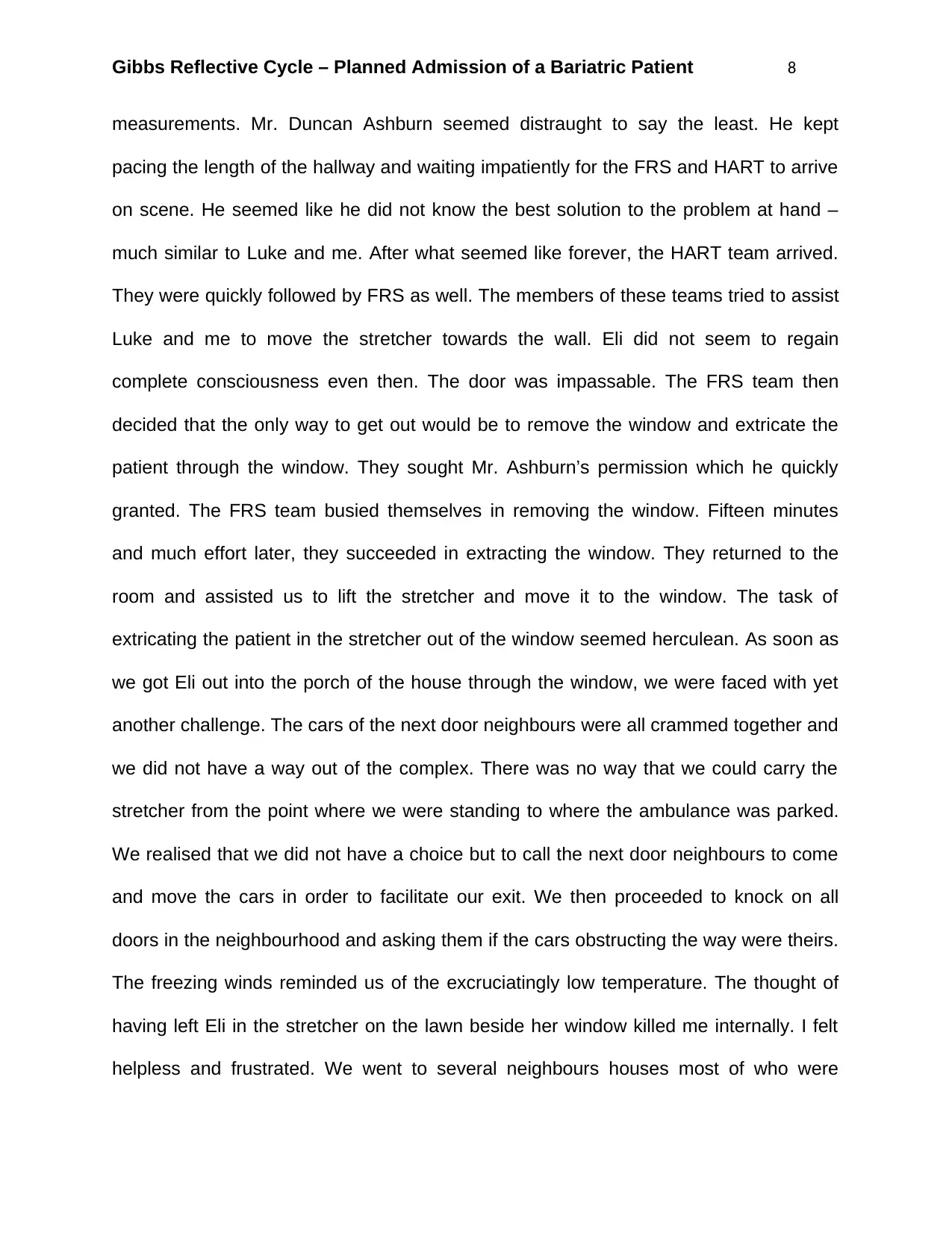
Gibbs Reflective Cycle – Planned Admission of a Bariatric Patient 8
measurements. Mr. Duncan Ashburn seemed distraught to say the least. He kept
pacing the length of the hallway and waiting impatiently for the FRS and HART to arrive
on scene. He seemed like he did not know the best solution to the problem at hand –
much similar to Luke and me. After what seemed like forever, the HART team arrived.
They were quickly followed by FRS as well. The members of these teams tried to assist
Luke and me to move the stretcher towards the wall. Eli did not seem to regain
complete consciousness even then. The door was impassable. The FRS team then
decided that the only way to get out would be to remove the window and extricate the
patient through the window. They sought Mr. Ashburn’s permission which he quickly
granted. The FRS team busied themselves in removing the window. Fifteen minutes
and much effort later, they succeeded in extracting the window. They returned to the
room and assisted us to lift the stretcher and move it to the window. The task of
extricating the patient in the stretcher out of the window seemed herculean. As soon as
we got Eli out into the porch of the house through the window, we were faced with yet
another challenge. The cars of the next door neighbours were all crammed together and
we did not have a way out of the complex. There was no way that we could carry the
stretcher from the point where we were standing to where the ambulance was parked.
We realised that we did not have a choice but to call the next door neighbours to come
and move the cars in order to facilitate our exit. We then proceeded to knock on all
doors in the neighbourhood and asking them if the cars obstructing the way were theirs.
The freezing winds reminded us of the excruciatingly low temperature. The thought of
having left Eli in the stretcher on the lawn beside her window killed me internally. I felt
helpless and frustrated. We went to several neighbours houses most of who were
measurements. Mr. Duncan Ashburn seemed distraught to say the least. He kept
pacing the length of the hallway and waiting impatiently for the FRS and HART to arrive
on scene. He seemed like he did not know the best solution to the problem at hand –
much similar to Luke and me. After what seemed like forever, the HART team arrived.
They were quickly followed by FRS as well. The members of these teams tried to assist
Luke and me to move the stretcher towards the wall. Eli did not seem to regain
complete consciousness even then. The door was impassable. The FRS team then
decided that the only way to get out would be to remove the window and extricate the
patient through the window. They sought Mr. Ashburn’s permission which he quickly
granted. The FRS team busied themselves in removing the window. Fifteen minutes
and much effort later, they succeeded in extracting the window. They returned to the
room and assisted us to lift the stretcher and move it to the window. The task of
extricating the patient in the stretcher out of the window seemed herculean. As soon as
we got Eli out into the porch of the house through the window, we were faced with yet
another challenge. The cars of the next door neighbours were all crammed together and
we did not have a way out of the complex. There was no way that we could carry the
stretcher from the point where we were standing to where the ambulance was parked.
We realised that we did not have a choice but to call the next door neighbours to come
and move the cars in order to facilitate our exit. We then proceeded to knock on all
doors in the neighbourhood and asking them if the cars obstructing the way were theirs.
The freezing winds reminded us of the excruciatingly low temperature. The thought of
having left Eli in the stretcher on the lawn beside her window killed me internally. I felt
helpless and frustrated. We went to several neighbours houses most of who were
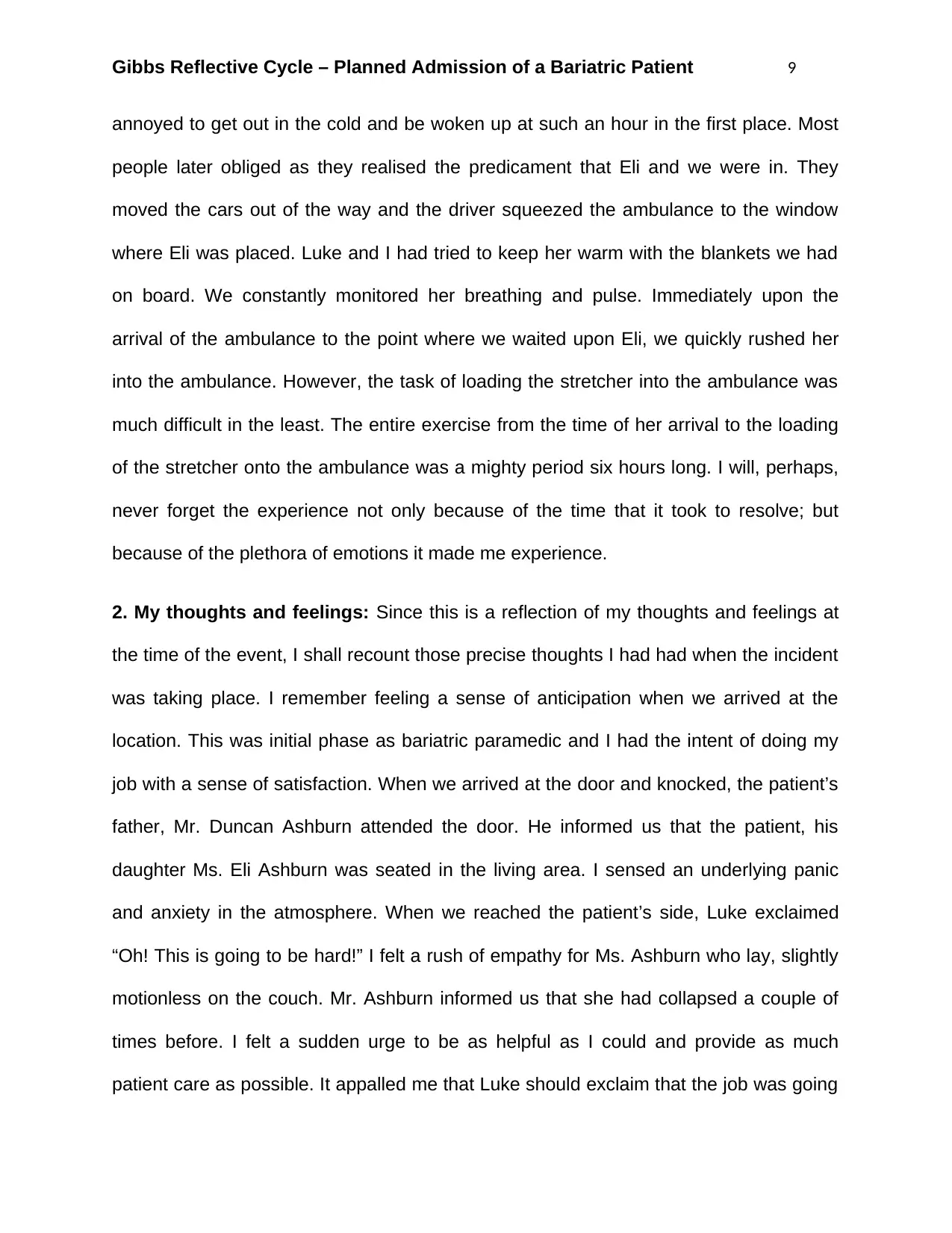
Gibbs Reflective Cycle – Planned Admission of a Bariatric Patient 9
annoyed to get out in the cold and be woken up at such an hour in the first place. Most
people later obliged as they realised the predicament that Eli and we were in. They
moved the cars out of the way and the driver squeezed the ambulance to the window
where Eli was placed. Luke and I had tried to keep her warm with the blankets we had
on board. We constantly monitored her breathing and pulse. Immediately upon the
arrival of the ambulance to the point where we waited upon Eli, we quickly rushed her
into the ambulance. However, the task of loading the stretcher into the ambulance was
much difficult in the least. The entire exercise from the time of her arrival to the loading
of the stretcher onto the ambulance was a mighty period six hours long. I will, perhaps,
never forget the experience not only because of the time that it took to resolve; but
because of the plethora of emotions it made me experience.
2. My thoughts and feelings: Since this is a reflection of my thoughts and feelings at
the time of the event, I shall recount those precise thoughts I had had when the incident
was taking place. I remember feeling a sense of anticipation when we arrived at the
location. This was initial phase as bariatric paramedic and I had the intent of doing my
job with a sense of satisfaction. When we arrived at the door and knocked, the patient’s
father, Mr. Duncan Ashburn attended the door. He informed us that the patient, his
daughter Ms. Eli Ashburn was seated in the living area. I sensed an underlying panic
and anxiety in the atmosphere. When we reached the patient’s side, Luke exclaimed
“Oh! This is going to be hard!” I felt a rush of empathy for Ms. Ashburn who lay, slightly
motionless on the couch. Mr. Ashburn informed us that she had collapsed a couple of
times before. I felt a sudden urge to be as helpful as I could and provide as much
patient care as possible. It appalled me that Luke should exclaim that the job was going
annoyed to get out in the cold and be woken up at such an hour in the first place. Most
people later obliged as they realised the predicament that Eli and we were in. They
moved the cars out of the way and the driver squeezed the ambulance to the window
where Eli was placed. Luke and I had tried to keep her warm with the blankets we had
on board. We constantly monitored her breathing and pulse. Immediately upon the
arrival of the ambulance to the point where we waited upon Eli, we quickly rushed her
into the ambulance. However, the task of loading the stretcher into the ambulance was
much difficult in the least. The entire exercise from the time of her arrival to the loading
of the stretcher onto the ambulance was a mighty period six hours long. I will, perhaps,
never forget the experience not only because of the time that it took to resolve; but
because of the plethora of emotions it made me experience.
2. My thoughts and feelings: Since this is a reflection of my thoughts and feelings at
the time of the event, I shall recount those precise thoughts I had had when the incident
was taking place. I remember feeling a sense of anticipation when we arrived at the
location. This was initial phase as bariatric paramedic and I had the intent of doing my
job with a sense of satisfaction. When we arrived at the door and knocked, the patient’s
father, Mr. Duncan Ashburn attended the door. He informed us that the patient, his
daughter Ms. Eli Ashburn was seated in the living area. I sensed an underlying panic
and anxiety in the atmosphere. When we reached the patient’s side, Luke exclaimed
“Oh! This is going to be hard!” I felt a rush of empathy for Ms. Ashburn who lay, slightly
motionless on the couch. Mr. Ashburn informed us that she had collapsed a couple of
times before. I felt a sudden urge to be as helpful as I could and provide as much
patient care as possible. It appalled me that Luke should exclaim that the job was going
⊘ This is a preview!⊘
Do you want full access?
Subscribe today to unlock all pages.

Trusted by 1+ million students worldwide
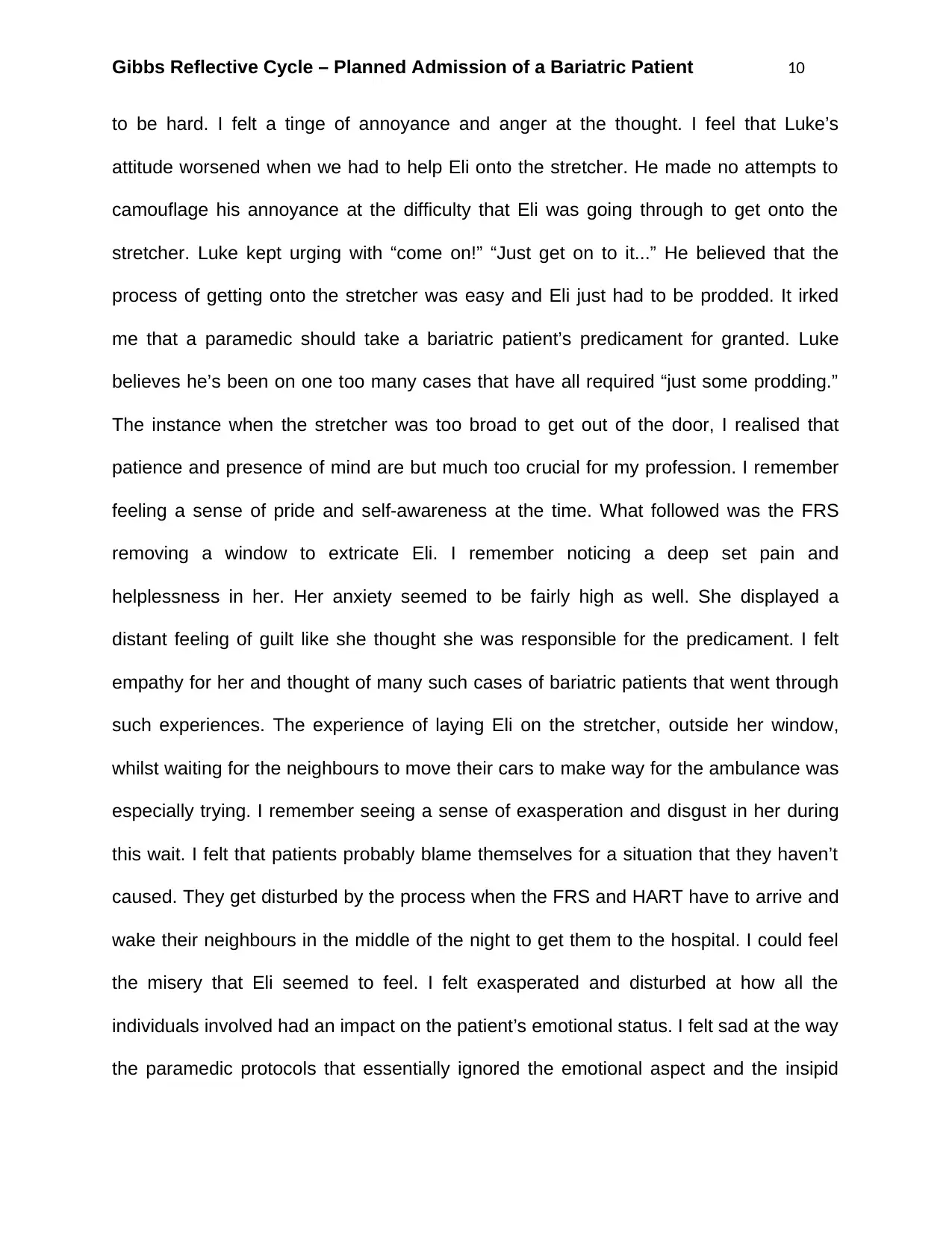
Gibbs Reflective Cycle – Planned Admission of a Bariatric Patient 10
to be hard. I felt a tinge of annoyance and anger at the thought. I feel that Luke’s
attitude worsened when we had to help Eli onto the stretcher. He made no attempts to
camouflage his annoyance at the difficulty that Eli was going through to get onto the
stretcher. Luke kept urging with “come on!” “Just get on to it...” He believed that the
process of getting onto the stretcher was easy and Eli just had to be prodded. It irked
me that a paramedic should take a bariatric patient’s predicament for granted. Luke
believes he’s been on one too many cases that have all required “just some prodding.”
The instance when the stretcher was too broad to get out of the door, I realised that
patience and presence of mind are but much too crucial for my profession. I remember
feeling a sense of pride and self-awareness at the time. What followed was the FRS
removing a window to extricate Eli. I remember noticing a deep set pain and
helplessness in her. Her anxiety seemed to be fairly high as well. She displayed a
distant feeling of guilt like she thought she was responsible for the predicament. I felt
empathy for her and thought of many such cases of bariatric patients that went through
such experiences. The experience of laying Eli on the stretcher, outside her window,
whilst waiting for the neighbours to move their cars to make way for the ambulance was
especially trying. I remember seeing a sense of exasperation and disgust in her during
this wait. I felt that patients probably blame themselves for a situation that they haven’t
caused. They get disturbed by the process when the FRS and HART have to arrive and
wake their neighbours in the middle of the night to get them to the hospital. I could feel
the misery that Eli seemed to feel. I felt exasperated and disturbed at how all the
individuals involved had an impact on the patient’s emotional status. I felt sad at the way
the paramedic protocols that essentially ignored the emotional aspect and the insipid
to be hard. I felt a tinge of annoyance and anger at the thought. I feel that Luke’s
attitude worsened when we had to help Eli onto the stretcher. He made no attempts to
camouflage his annoyance at the difficulty that Eli was going through to get onto the
stretcher. Luke kept urging with “come on!” “Just get on to it...” He believed that the
process of getting onto the stretcher was easy and Eli just had to be prodded. It irked
me that a paramedic should take a bariatric patient’s predicament for granted. Luke
believes he’s been on one too many cases that have all required “just some prodding.”
The instance when the stretcher was too broad to get out of the door, I realised that
patience and presence of mind are but much too crucial for my profession. I remember
feeling a sense of pride and self-awareness at the time. What followed was the FRS
removing a window to extricate Eli. I remember noticing a deep set pain and
helplessness in her. Her anxiety seemed to be fairly high as well. She displayed a
distant feeling of guilt like she thought she was responsible for the predicament. I felt
empathy for her and thought of many such cases of bariatric patients that went through
such experiences. The experience of laying Eli on the stretcher, outside her window,
whilst waiting for the neighbours to move their cars to make way for the ambulance was
especially trying. I remember seeing a sense of exasperation and disgust in her during
this wait. I felt that patients probably blame themselves for a situation that they haven’t
caused. They get disturbed by the process when the FRS and HART have to arrive and
wake their neighbours in the middle of the night to get them to the hospital. I could feel
the misery that Eli seemed to feel. I felt exasperated and disturbed at how all the
individuals involved had an impact on the patient’s emotional status. I felt sad at the way
the paramedic protocols that essentially ignored the emotional aspect and the insipid
Paraphrase This Document
Need a fresh take? Get an instant paraphrase of this document with our AI Paraphraser
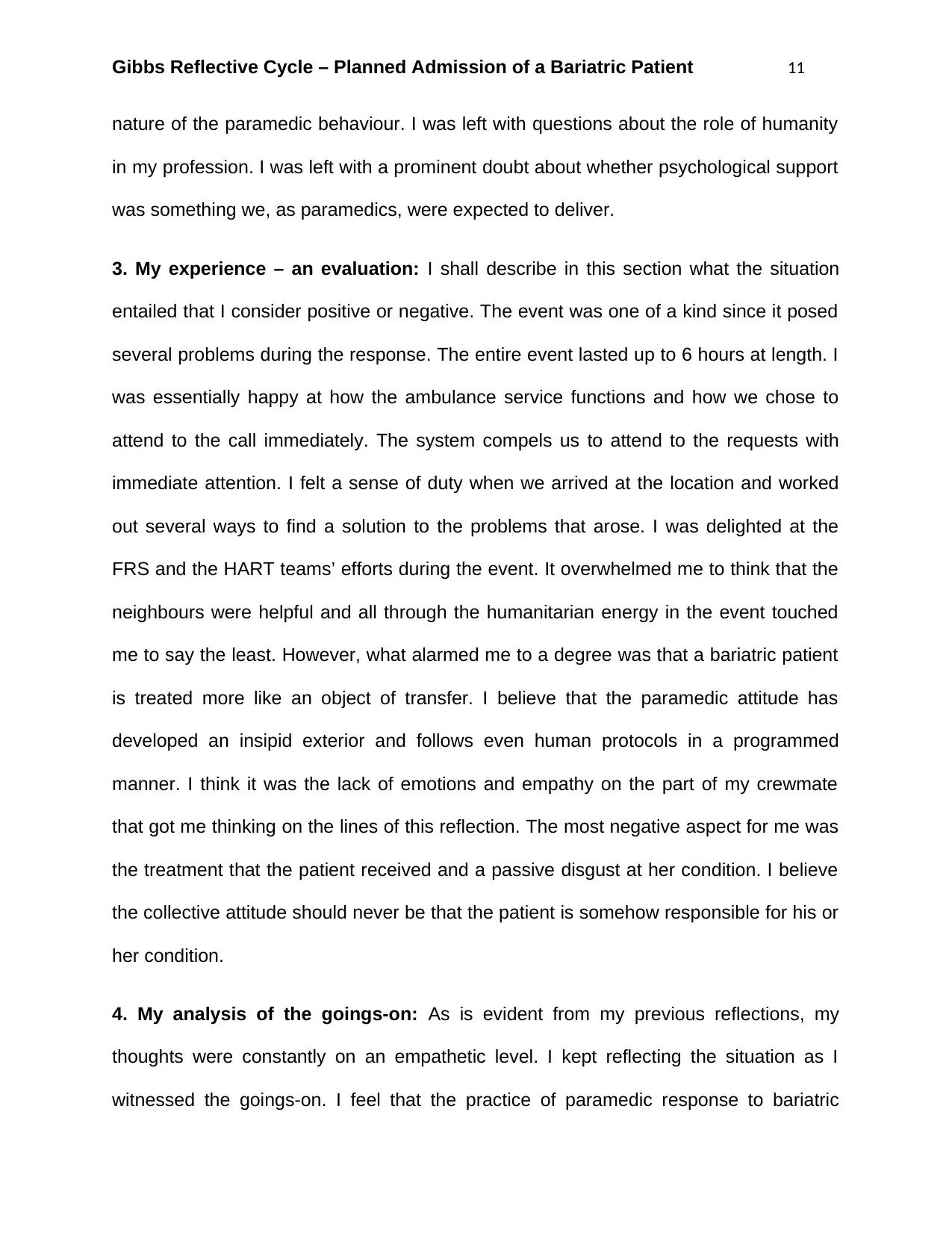
Gibbs Reflective Cycle – Planned Admission of a Bariatric Patient 11
nature of the paramedic behaviour. I was left with questions about the role of humanity
in my profession. I was left with a prominent doubt about whether psychological support
was something we, as paramedics, were expected to deliver.
3. My experience – an evaluation: I shall describe in this section what the situation
entailed that I consider positive or negative. The event was one of a kind since it posed
several problems during the response. The entire event lasted up to 6 hours at length. I
was essentially happy at how the ambulance service functions and how we chose to
attend to the call immediately. The system compels us to attend to the requests with
immediate attention. I felt a sense of duty when we arrived at the location and worked
out several ways to find a solution to the problems that arose. I was delighted at the
FRS and the HART teams’ efforts during the event. It overwhelmed me to think that the
neighbours were helpful and all through the humanitarian energy in the event touched
me to say the least. However, what alarmed me to a degree was that a bariatric patient
is treated more like an object of transfer. I believe that the paramedic attitude has
developed an insipid exterior and follows even human protocols in a programmed
manner. I think it was the lack of emotions and empathy on the part of my crewmate
that got me thinking on the lines of this reflection. The most negative aspect for me was
the treatment that the patient received and a passive disgust at her condition. I believe
the collective attitude should never be that the patient is somehow responsible for his or
her condition.
4. My analysis of the goings-on: As is evident from my previous reflections, my
thoughts were constantly on an empathetic level. I kept reflecting the situation as I
witnessed the goings-on. I feel that the practice of paramedic response to bariatric
nature of the paramedic behaviour. I was left with questions about the role of humanity
in my profession. I was left with a prominent doubt about whether psychological support
was something we, as paramedics, were expected to deliver.
3. My experience – an evaluation: I shall describe in this section what the situation
entailed that I consider positive or negative. The event was one of a kind since it posed
several problems during the response. The entire event lasted up to 6 hours at length. I
was essentially happy at how the ambulance service functions and how we chose to
attend to the call immediately. The system compels us to attend to the requests with
immediate attention. I felt a sense of duty when we arrived at the location and worked
out several ways to find a solution to the problems that arose. I was delighted at the
FRS and the HART teams’ efforts during the event. It overwhelmed me to think that the
neighbours were helpful and all through the humanitarian energy in the event touched
me to say the least. However, what alarmed me to a degree was that a bariatric patient
is treated more like an object of transfer. I believe that the paramedic attitude has
developed an insipid exterior and follows even human protocols in a programmed
manner. I think it was the lack of emotions and empathy on the part of my crewmate
that got me thinking on the lines of this reflection. The most negative aspect for me was
the treatment that the patient received and a passive disgust at her condition. I believe
the collective attitude should never be that the patient is somehow responsible for his or
her condition.
4. My analysis of the goings-on: As is evident from my previous reflections, my
thoughts were constantly on an empathetic level. I kept reflecting the situation as I
witnessed the goings-on. I feel that the practice of paramedic response to bariatric
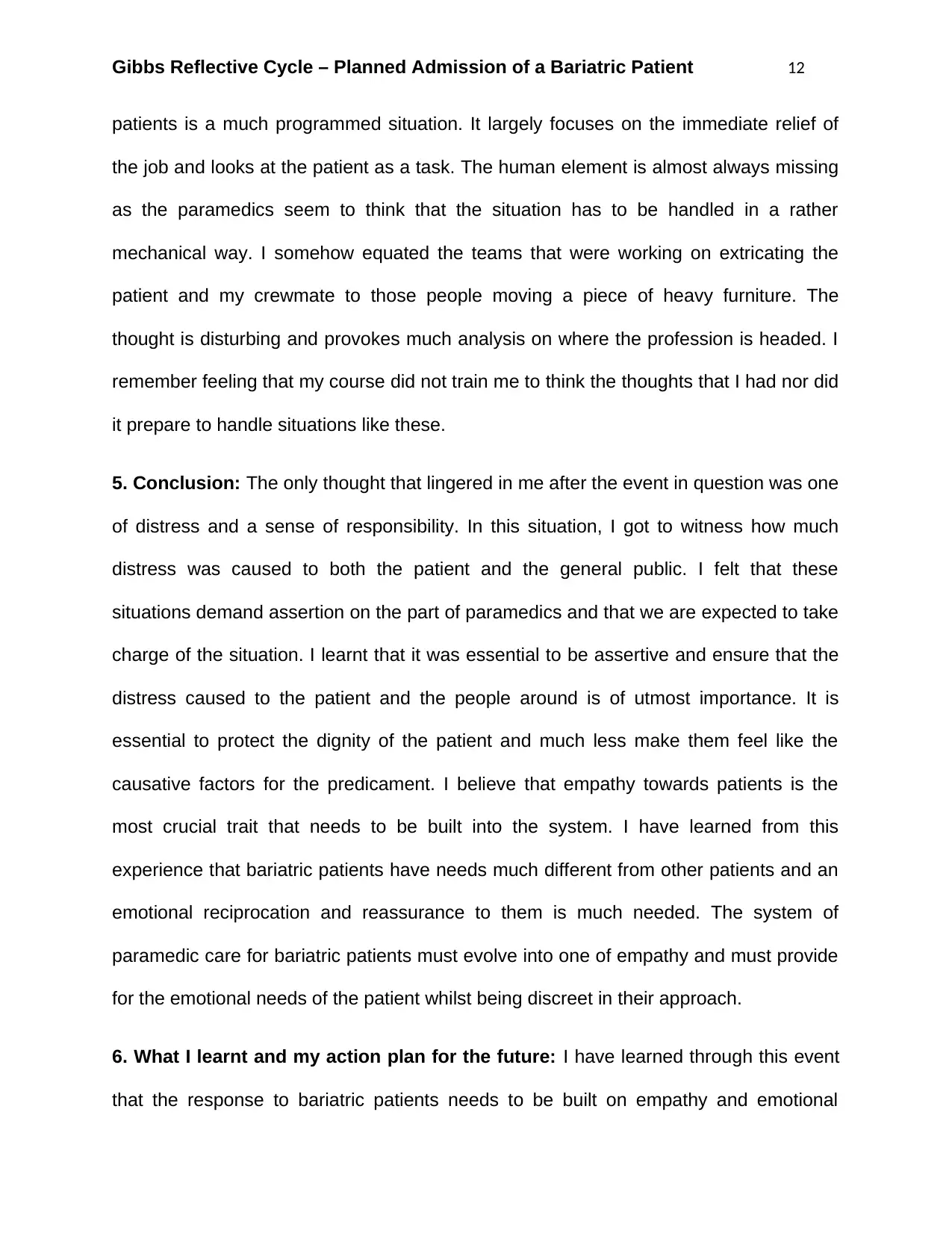
Gibbs Reflective Cycle – Planned Admission of a Bariatric Patient 12
patients is a much programmed situation. It largely focuses on the immediate relief of
the job and looks at the patient as a task. The human element is almost always missing
as the paramedics seem to think that the situation has to be handled in a rather
mechanical way. I somehow equated the teams that were working on extricating the
patient and my crewmate to those people moving a piece of heavy furniture. The
thought is disturbing and provokes much analysis on where the profession is headed. I
remember feeling that my course did not train me to think the thoughts that I had nor did
it prepare to handle situations like these.
5. Conclusion: The only thought that lingered in me after the event in question was one
of distress and a sense of responsibility. In this situation, I got to witness how much
distress was caused to both the patient and the general public. I felt that these
situations demand assertion on the part of paramedics and that we are expected to take
charge of the situation. I learnt that it was essential to be assertive and ensure that the
distress caused to the patient and the people around is of utmost importance. It is
essential to protect the dignity of the patient and much less make them feel like the
causative factors for the predicament. I believe that empathy towards patients is the
most crucial trait that needs to be built into the system. I have learned from this
experience that bariatric patients have needs much different from other patients and an
emotional reciprocation and reassurance to them is much needed. The system of
paramedic care for bariatric patients must evolve into one of empathy and must provide
for the emotional needs of the patient whilst being discreet in their approach.
6. What I learnt and my action plan for the future: I have learned through this event
that the response to bariatric patients needs to be built on empathy and emotional
patients is a much programmed situation. It largely focuses on the immediate relief of
the job and looks at the patient as a task. The human element is almost always missing
as the paramedics seem to think that the situation has to be handled in a rather
mechanical way. I somehow equated the teams that were working on extricating the
patient and my crewmate to those people moving a piece of heavy furniture. The
thought is disturbing and provokes much analysis on where the profession is headed. I
remember feeling that my course did not train me to think the thoughts that I had nor did
it prepare to handle situations like these.
5. Conclusion: The only thought that lingered in me after the event in question was one
of distress and a sense of responsibility. In this situation, I got to witness how much
distress was caused to both the patient and the general public. I felt that these
situations demand assertion on the part of paramedics and that we are expected to take
charge of the situation. I learnt that it was essential to be assertive and ensure that the
distress caused to the patient and the people around is of utmost importance. It is
essential to protect the dignity of the patient and much less make them feel like the
causative factors for the predicament. I believe that empathy towards patients is the
most crucial trait that needs to be built into the system. I have learned from this
experience that bariatric patients have needs much different from other patients and an
emotional reciprocation and reassurance to them is much needed. The system of
paramedic care for bariatric patients must evolve into one of empathy and must provide
for the emotional needs of the patient whilst being discreet in their approach.
6. What I learnt and my action plan for the future: I have learned through this event
that the response to bariatric patients needs to be built on empathy and emotional
⊘ This is a preview!⊘
Do you want full access?
Subscribe today to unlock all pages.

Trusted by 1+ million students worldwide
1 out of 15
Related Documents
Your All-in-One AI-Powered Toolkit for Academic Success.
+13062052269
info@desklib.com
Available 24*7 on WhatsApp / Email
![[object Object]](/_next/static/media/star-bottom.7253800d.svg)
Unlock your academic potential
Copyright © 2020–2026 A2Z Services. All Rights Reserved. Developed and managed by ZUCOL.



